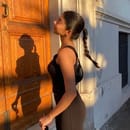Content warning: This story mentions rape and sexual assault.
Lana Del Rey’s ninth studio album, Did you know that there’s a tunnel under Ocean Blvd, is a self-portrait containing excerpts of the darkest and lightest moments of the artist’s life.
“F*ck me to death, love me until I love myself,” Del Rey sings on the album’s title track.
It’s a tale Del Rey knows all too well — seeking validation from a man and feeling wanted, only to be disappointed when the infatuation fades away, and the relationship falls apart. While love and heartbreak have always been major themes in Del Rey’s songs, Did you know that there’s a tunnel under Ocean Blvd goes beyond that, focusing on family, childhood, loss, and new beginnings. The poignant lyrics are tied together with orchestral instrumentation, choir vocals, layered, hymn-like harmonies, and Del Rey’s enchanting head voice.
“The Grants” sucks you in with background gospel vocals as Del Rey reflects on grief and loss through religious imagery. She addresses loved ones, like her sister and niece, describing how she will never forget them, even if they were to vanish from her life.
Religion is a vivid theme throughout the 16-track album, most strikingly in track five, “Judah Smith Interlude.” Smith, a pastor from Beverly Hills, fills the fifth track with almost five minutes of preaching, accompanied by uplifting, haunting piano from Jack Antonoff, one of the five producers on the album. The interlude is confusing and almost jarring at first, as Del Rey laughs and inserts seemingly sarcastic commentary throughout the track.
The most interesting part of his sermon is the last line, “I used to think my preaching was mostly about you … I’ve discovered my preaching is mostly about me,” emphasizing the overarching theme of self-reflection that this album offers.
The interlude is also juxtaposed with track four, “A&W,” which, according to Del Rey, stands for “American Whore.” This seven-minute track is musically and lyrically composed as two different songs. It starts off as a ballad, with intricate guitar patterns and delicate piano chords, while Del Rey sings about her childhood innocence. It then shifts into a song about sex and adulthood, paired with a funky bass and synth combo.
She sings, “If I told you that I was raped/Do you really think that anybody would think I didn’t ask for it,” where she addresses real and raw topics prevalent in both her life and society.
The differences between “Judah Smith Interlude” and “A&W” are no accident as it leaves you wondering if Smith’s words are inserted for irony or if there are deeper meanings to this unique yet controversial addition to the album.
Del Rey works with several artists on this album, including Bleachers, Father John Misty and Jon Batiste. Batiste is featured in “Candy Necklace,” a classic Del Rey piece composed with her hauntingly beautiful vocals, as the two artists sing about a reckless, obsessive relationship backed by a delicate piano track.
But it’s songs like “Fingertips,” “Grandfather please stand on the shoulders of my father while he’s deep-sea fishing,” and “Fishtail” that set this album apart from her others.
Unlike songs from Born to Die, Ultraviolence or the stunning Norman F*cking Rockwell, which all deal with romance, toxicity, death, twisted love and rebellion, parts of Did you know there’s a tunnel under Ocean Blvd show a different side of Del Rey as she sings about motherhood, family and loss in a way we’ve never heard before.
In track nine, “Fingertips,” she sings, “Charlie, stop smoking/Caroline, will you be with me?/Will the baby be alright?/Will I have one of mine?”
She sings about her siblings, showing she cares for them while questioning and wondering about her own future. It seems Del Rey is almost asking for reassurance on this track as her hollow vocals support the song with layers of orchestral instrumentation and crescendos, adding drama to this ballad.
Track 11, “Grandfather please stand on the shoulders of my father while he’s deep-sea fishing,” is a gorgeous ode to her family as she talks to her grandfather’s spirit, asking him to protect her father while he’s fishing.
Lines like, “God, if you’rе near me, send mе three white butterflies/Or an owl to know you’re listening, sitting while I’m drinking,” seem so personal that only Del Rey could truly explain the significance and meaning behind them.
But it wouldn’t be a Lana Del Rey album without humour and quirky, relatable references.
Lyrics, such as “If you want some basic bitch, go to the Beverly Center and find her” in track three, “Sweet,” and “Pass me my vape/I’m feelin’ sick/I need to take a puff,” in Track 16, “Taco Truck x VB” keep the album playful, amidst the seriousness of it all.
“Let The Light In,” featuring Father John Misty, feels reminiscent of her 2017 album, Lust for Life, specifically the track “Tomorrow Never Came.” Del Rey’s sultry vocals, in combination with an overall sixties bluesy, country vibe, feel timeless as she paints the ideal picture of wanting a wholesome life, a house in the country, and domesticity —even if the relationship she sings about seems somewhat secretive.
The final track, “Taco Truck x VB,” is the perfect ending to this intricate album, as she honours her old music with a call back to Norman Fucking Rockwell’s “Venice Bitch,” an iconic track from her 2018 album. It’s an upbeat rendition that leaves listeners remembering everything Del Rey has to offer.
Did you know that there’s a tunnel under Ocean Blvd is complex, sweet, hopeful, memorable, quiet and loud, light and dark, just like Del Rey, as she describes her life through her art.


